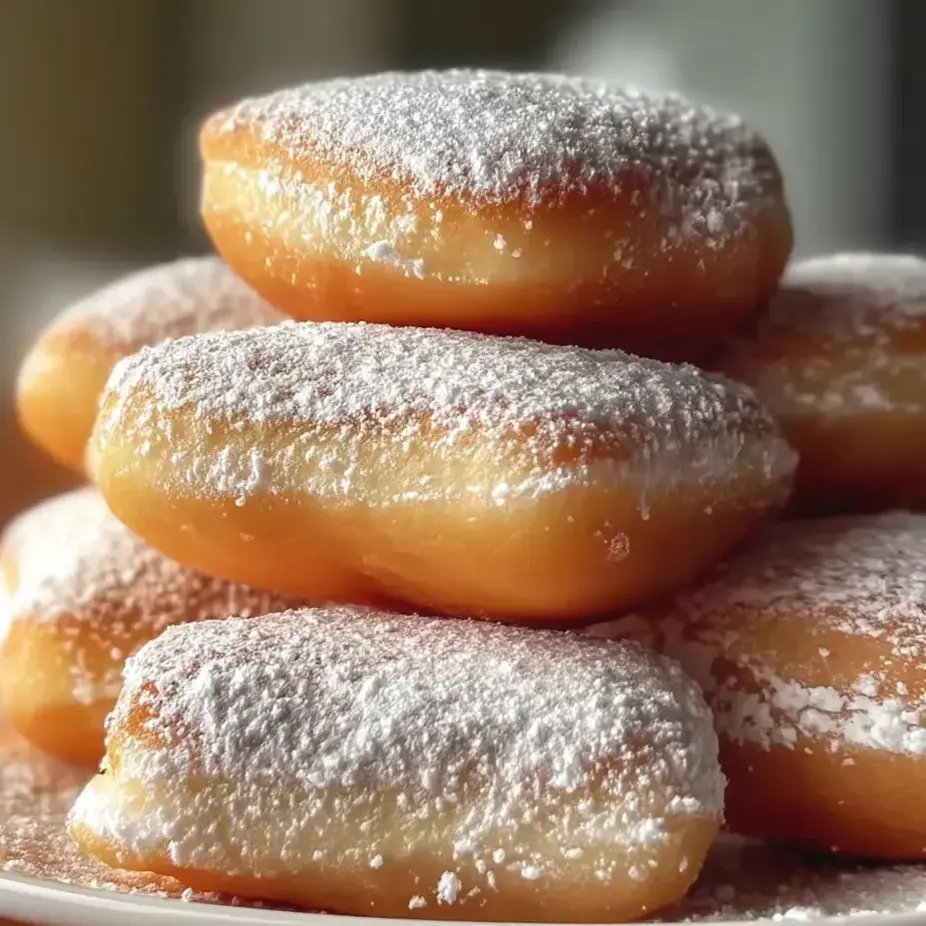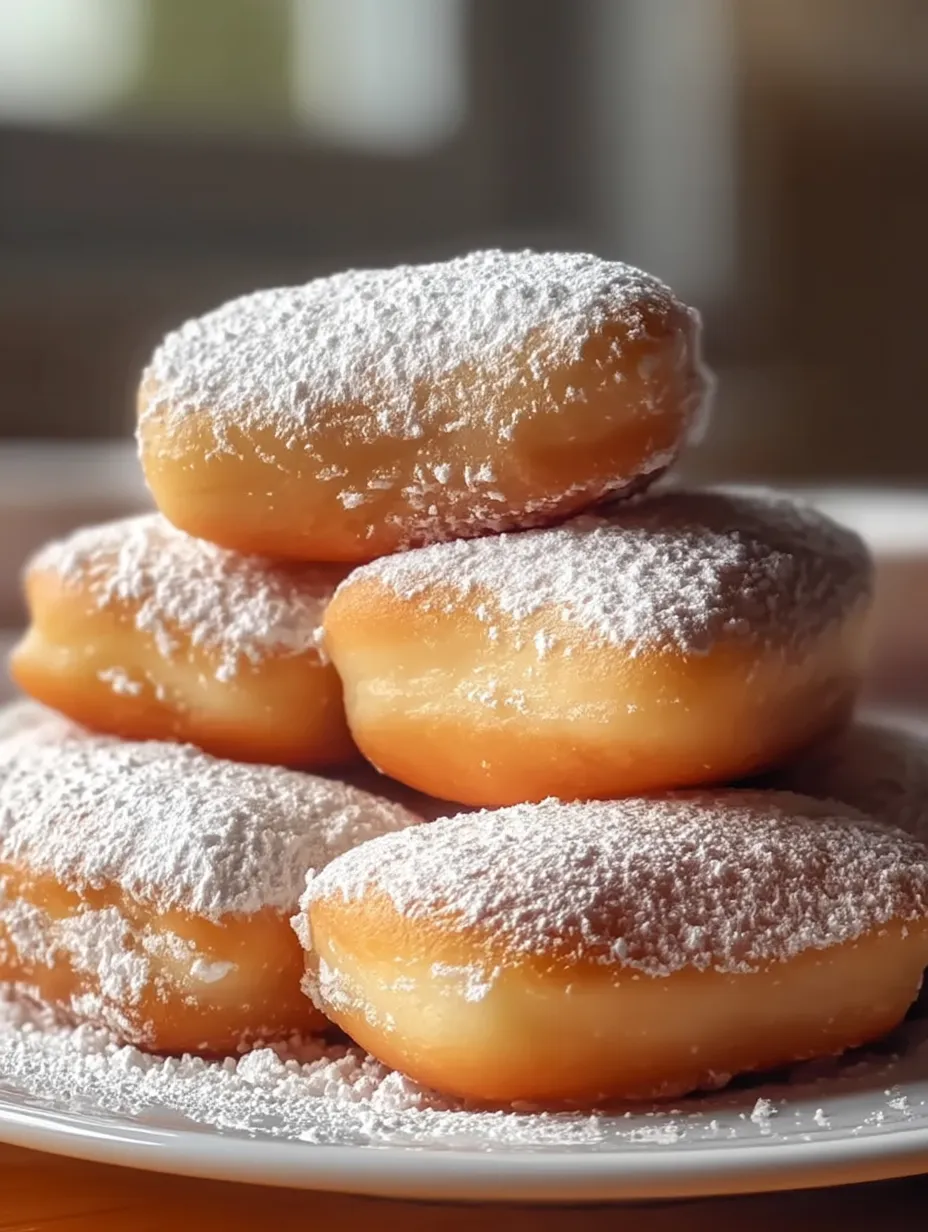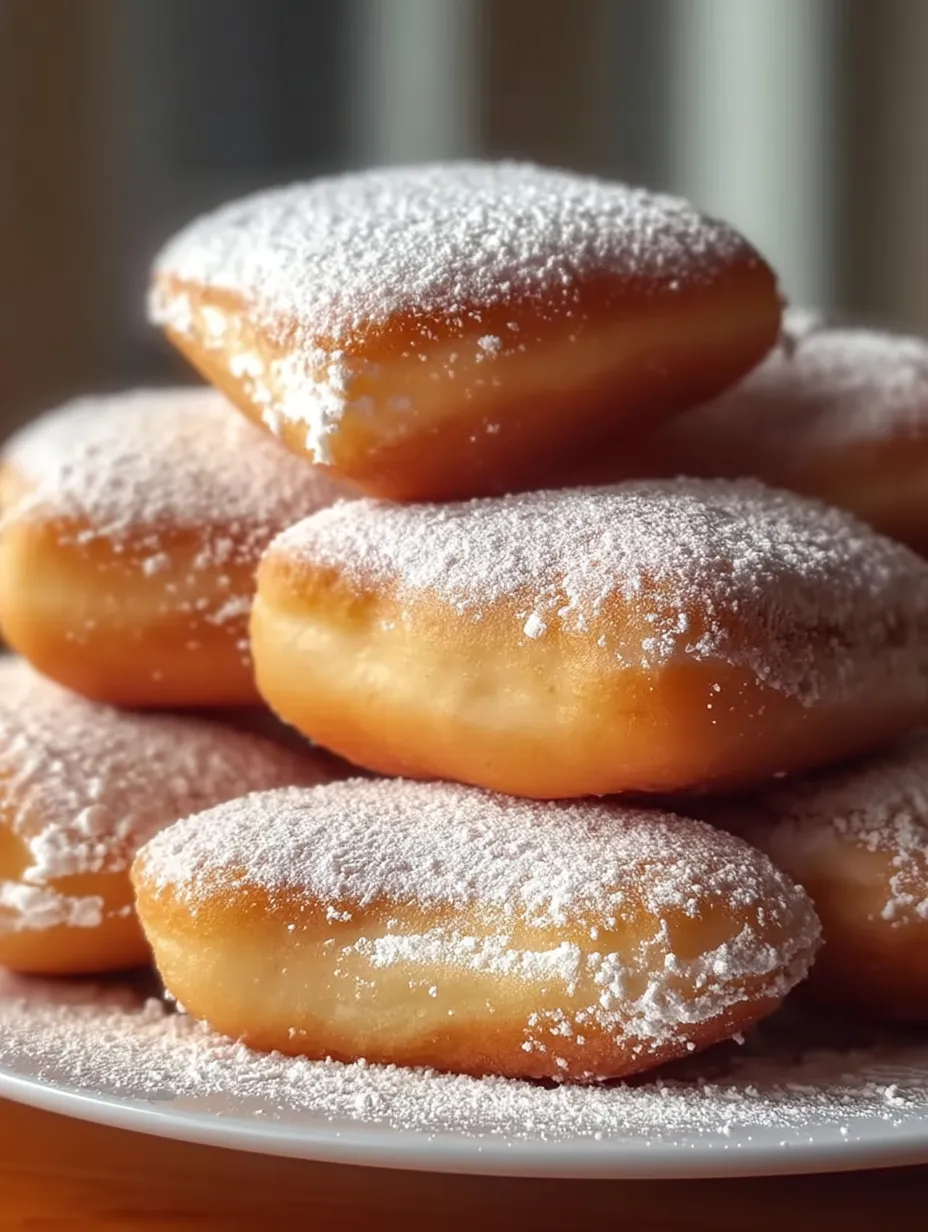 Pin it
Pin it
This homemade vanilla French beignet recipe transforms simple pantry ingredients into delightful pillowy pastries dusted with powdered sugar. The combination of vanilla and yeast creates that authentic New Orleans flavor right in your own kitchen.
I discovered these beignets during a trip to New Orleans and have been perfecting this recipe ever since. My children now request these as a special weekend breakfast treat, especially when we have guests staying over.
Ingredients
- All purpose flour: Provides structure while keeping the beignets tender
- Granulated sugar: Adds just enough sweetness without overpowering
- Active dry yeast: Creates those signature air pockets for fluffy texture
- Warm milk: Activates the yeast and adds richness to the dough
- Eggs: Provide structure and richness that make these beignets special
- Vanilla extract: Brings warmth and depth to the flavor profile
- Unsalted butter: Adds richness and helps create a tender crumb
- Salt: Enhances all flavors and balances the sweetness
- Vegetable oil: For frying, choose a neutral flavor with high smoke point
- Powdered sugar: For dusting, use generously for authentic presentation
Step-by-Step Instructions
- Activate the Yeast:
- Combine warm milk around 110°F with active dry yeast in a small bowl. The temperature is crucial here: too hot and you'll kill the yeast, too cool and it won't activate properly. Let it sit undisturbed for 5-10 minutes until you see a frothy layer on top, which indicates the yeast is alive and active.
- Create the Dough Base:
- Whisk together flour, sugar, and salt in a large mixing bowl to evenly distribute the ingredients. Form a well in the center like a volcano crater and pour in your frothy yeast mixture, eggs, melted butter, and vanilla extract. Stir gently at first, then more vigorously until a sticky, shaggy dough forms.
- Develop the Gluten:
- Transfer your dough to a lightly floured surface and knead for 5-7 minutes. This develops the gluten which gives beignets their distinctive chew. The dough will transform from sticky and rough to smooth and elastic. When you press a finger into it, it should slowly spring back.
- First Rise:
- Place the kneaded dough in a greased bowl and cover with a clean kitchen towel. Find a warm, draft-free spot in your kitchen and let the dough rise for 1-1.5 hours. Patience is key here as this rise develops flavor and texture. The dough should visibly double in size.
- Shape Your Beignets:
- Gently punch down the risen dough to release air bubbles. Roll the dough on a floured surface to about half inch thickness. Use a sharp knife or pizza cutter to cut into 2x2 inch squares. Keep the cuts clean and decisive for even cooking.
- Prepare the Frying Oil:
- Heat vegetable oil in a heavy bottomed pot to exactly 350°F. Use a thermometer for precision as temperature control is crucial. Too cool and the beignets absorb oil, too hot and they brown before cooking through.
- Fry to Golden Perfection:
- Work in small batches of 3-4 beignets at a time to maintain oil temperature. Each beignet needs space to expand and float freely. Fry for 1-2 minutes per side until they reach a rich golden brown. They should puff dramatically in the hot oil.
- Finish with Powdered Sugar:
- Transfer fried beignets to paper towels to drain excess oil, then dust generously with powdered sugar while still warm. The heat helps the sugar adhere to the surface. Be extraordinarily generous with the sugar for authentic presentation.
 Pin it
Pin it
The vanilla in this recipe brings out the yeasty flavor in a way that makes these beignets irresistible. I learned from a New Orleans chef that the quality of vanilla makes all the difference here. When my grandmother first tried these, she closed her eyes and said they transported her back to her childhood visits to Louisiana.
Make Ahead Options
The beignet dough can be prepared the night before and allowed to rise slowly in the refrigerator. This cold fermentation actually improves the flavor complexity and makes morning preparation much quicker. Simply remove the dough from the refrigerator about 30 minutes before rolling and cutting to allow it to warm slightly for easier handling.
 Pin it
Pin it
Perfect Pairings
Traditionally these beignets are served with café au lait, strong coffee mixed with hot milk. The slight bitterness of the coffee contrasts beautifully with the sweet beignets. For a modern twist, try serving them with hot chocolate or even a dessert wine for an elegant evening treat. A fruit compote on the side adds a pleasant tartness that balances the richness.
Cultural Significance
Beignets arrived in New Orleans with French colonists in the 18th century and became firmly established in Louisiana Creole cuisine. The word "beignet" comes from the early Celtic word "bigne" meaning "to raise." They became famous at Café du Monde in the French Quarter, which has been serving them 24 hours a day since 1862. This recipe maintains that traditional essence while being accessible for home cooks.
Troubleshooting Tips
If your beignets aren't puffing properly, your oil temperature might be fluctuating too much. Keep a thermometer in the oil and adjust your heat as needed.
Frequently Asked Questions
- → How do I ensure the dough is properly risen?
Place the dough in a warm area, cover it with a towel, and let it rise until it doubles in size. This can take 1–1.5 hours.
- → What oil is best for frying beignets?
Vegetable oil is ideal due to its high smoke point and neutral flavor. Ensure oil is at 350°F for perfect frying.
- → How do I achieve the right texture for beignets?
Knead the dough until smooth and elastic, and avoid over-frying. Beignets should be fluffy and golden.
- → Can I prepare the dough in advance?
Yes, you can refrigerate the dough after the first rise. Bring it to room temperature before proceeding.
- → Why is the yeast mixture not frothy?
Your milk might be too hot or too cold. Ensure it's warm (about 110°F) to activate the yeast properly.
